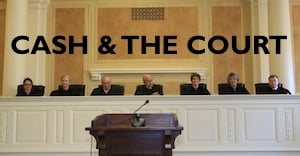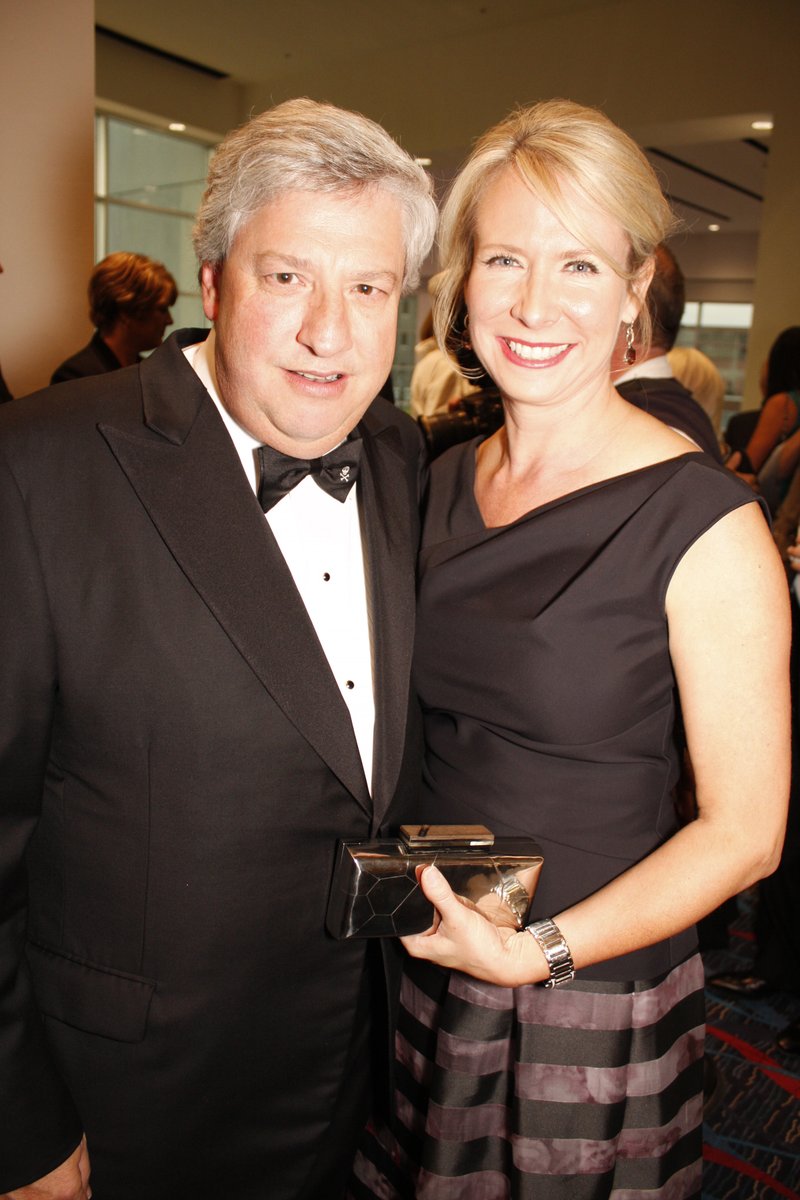The costliest-ever Arkansas Supreme Court race piled up more than $900,000 in campaign contributions for two candidates in 2010.

- MAIN MENU
- PART I: 6 law firms top donations list
- PART II: Top donors net big wins
- PART III: Campaign money stirs debate over how judges picked
- State justices respond to donation questions
- After 2010 high court race, justice wed a top donor
- Firms file suits, donate together
- INTERACTIVE: Breakdown of campaign contributions to justice candidates
- GRAPHIC: Class-action contributions to justices
- How we did it
The race pitted young Appeals Court Judge Courtney Henry of Fayetteville against a more experienced opponent, Circuit Judge John Fogleman of Marion.
Henry raised more money than Fogleman — about $574,000 to Fogleman’s $345,000, records show. And on election night, May 18, 2010, she carried almost 58 percent of the vote.
At age 37 , Henry became only the second woman ever elected to the Arkansas Supreme Court. A Harrison native, her resume listed about two years of experience as a judge.
The Henry-Fogleman race also was memorable for its postelection drama.
Henry’s husband, Fayetteville lawyer Mark Henry, had served as her campaign manager. His parents were longtime friends of former President Bill Clinton, and Clinton helped raise money for her Supreme Court race.
About a month after Election Day, on June 14, Mark Henry filed for divorce.
A little more than a year later, in late 2011, Courtney Henry married one of her big campaign donors: a Texarkana lawyer named John Goodson who had won millions in class-action lawsuits in Arkansas.
Goodson and his law firm, Keil & Goodson, and five outof-state firms that work with him contributed an estimated $142,500 to Courtney Henry’s campaign, campaign-finance records show.
Their gifts totaled about one of every four dollars in funds raised for her.
Fogleman says he was unaware at the start of their contest of “an organized effort by the class-action lawyers” to bankroll Courtney Henry.
But as the race played out, “it certainly looked like that,” he said in an interview.
Henry’s finance-disclosure reports showed “all these maximum contributions” of $2,000 each, Fogleman said. They came mostly from lawyers and law firms headquartered in Texarkana, Oklahoma, Texas and Pennsylvania.
And the donors weren’t only lawyers, but their spouses too — contributions “from what appeared to be husbands and wives,” he said.
Fogleman wondered about that money. After the race was over, “it made more sense to me about how she [Henry] was able to do that,” he said.
Courtney and John Goodson declined to be interviewed for these Arkansas Democrat-Gazette articles.
ABOUT $99,000
Mark Henry’s petition for divorce cited general indignities, according to Washington County court records.
Courtney Henry’s response said her husband was entitled to a divorce. Neither side spelled out any indignities.
But the new justice, like other elected officials and many appointees, was required to file annual financial-disclosure statements.
Courtney Henry’s Statement of Financial Interest for 2010 provides a glimpse into her personal life at the time of her election and divorce.
A section of the form asks for a list of gifts valued at more than $100. Three gifts from John Goodson were listed under the date June 2010, the same month Mark Henry filed for divorce. The statement did not list when in June the gifts were received.
First was a $5,500 trip, destination undisclosed, that included an airline ticket, lodging, meals and entertainment. Also that month, Goodson furnished the newly elected justice with a $780.63 coat and a $1,524.25 bag, according to the statement.
On July 15, 2010, 31 days after Mark Henry filed for divorce, his marriage to Courtney Henry was dissolved. Mark Henry gained primary custody of the couple’s three children, court records show.
That same month, John Goodson presented the Supreme Court justice-elect with two more trips, total value $8,500, and $9,500 in earrings.
Before 2010 ended, Goodson had given Courtney Henry 21 gifts with a cumulative value of about $99,000. Among them: six more trips totaling $32,853.80, a $22,500 watch, a $4,000 necklace, a $6,700 coat and three more bags totaling $2,302.77.
When Courtney Henry’s financial-disclosure statement was made public on Jan. 28, 2011, news media across the state published stories about the gifts. National legal and judicial ethics groups picked up the information.
The ABA Journal in Chicago, the American Bar Association’s monthly magazine, reported that an online professional profile of John Goodson “shows that he worked on a class action resulting in a $400 million payout to policyholders.”
By the time Goodson’s gifts became public, Courtney Henry was a sworn-in and sitting Arkansas Supreme Court justice. Her divorce was about 6 months old.
“I am dating John Goodson. He is my boyfriend. He has given me gifts,” she told the Democrat-Gazette at the time.
She also said she was recusing from all cases involving Goodson or his law firm. Court records show that she has disqualified herself from those cases.
‘TACTICAL ADVANTAGES’
A trustee of the University of Arkansas System appointed by former Democratic Gov. Mike Beebe, Johnny Goodson — as he is known by many — personally has contributed at least $334,994 to national and state political races since 2002.
The National Institute on Money in State Politics, which tracks campaign donations across 50 states, shows Goodson as a bipartisan contributor.
Among the recipients: Obama Victory Fund ($35,800 in 2012), National Republican Congressional Committee ($32,400 in 2013), Arkansas Democratic Party ($5,000 in 2011), Arkansas Republican Party, ($5,000 in 2013).
Goodson also donated $6,000 total to the 2010 and 2012 campaigns of Arkansas Sen. Jeremy Hutchinson of Little Rock, chairman of the Senate Judiciary Committee that “reviews matters pertaining to state and local courts,” according to a legislative website. And John Goodson gave $5,000 to Beebe campaigns between 2002 and 2010.
Goodson and his firm, Keil & Goodson of Texarkana, and five law firms from out of state also are among the biggest donors to all six elected justices who sit on the Arkansas Supreme Court.
The other law firms, which have worked regularly with Keil & Goodson on class actions, are: Nix Patterson & Roach of Daingerfield, Texas; Kessler Topaz Meltzer & Check of suburban Philadelphia; Crowley Norman of Houston, Texas; attorneys Reggie Whitten and Michael Burrage of Oklahoma, affiliated with several firms over the past dozen years; and attorney Jason Roselius of Oklahoma, also with multiple law firms, according to case records.
The son of a Miller County Circuit Court judge, Goodson probably is best known in Arkansas legal circles for winning class-action cases, in which plaintiffs seek to represent a larger group of people — a “class” — that claim they have been harmed in similar ways.
He has won or settled many of those cases in his home court: Miller County Circuit Court in Texarkana.
A 2012 brief filed with the U.S. Supreme Court in Standard Fire v. Knowles tallied attorneys’ fees awarded in class actions to Keil & Goodson and co-counsel firms between 2004 and 2011. The total from the “non-exhaustive list”: $420.9 million.
That list focused on law firms representing the Knowles’ side of the case, which according to federal court documents included Keil & Goodson, Nix Patterson & Roach, and Crowley Norman.
Standard Fire v. Knowles centered on efforts by Keil & Goodson and the other plaintiffs’ firms to keep certain class actions in Arkansas state courts instead of federal courts. These were cases with no more than $5 million at stake, according to filings in the case.
Knowles’ lawyers wanted the state court setting, insurers and others argued, because Arkansas’ rules for class-action cases — along with friendly circuit court judges — gave the plaintiffs’ side a better chance of winning.
The Arkansas Supreme Court sets rules and procedures for class-action cases.
“Arkansas class action law deviates from federal class action law in ways that afford class action [plaintiffs’] lawyers tactical advantages in Miller County,” the amicus brief filed by the Manufactured Housing Institute and five insurance companies alleged.
The document also cited what it called a national reputation of Texarkana’s Miller County courts as a “judicial hellhole” known for cooperating with class-action plaintiffs’ lawyers.
The Arkansas Trial Lawyers Association responded with a brief in Standard Fire, saying: “The criticisms of the Miller County Circuit Court and the Arkansas Supreme Court are unjustified.”
The trial lawyers described Arkansas as “an advance thinker” in rules regarding class-action cases.
When attorneys argued the Standard Fire v. Knowles case before the U.S. Supreme Court on Jan. 7, 2013, John and Courtney Goodson were in the gallery.
Courtney Goodson also met that day with U.S. Supreme Court Justice Antonin Scalia. It was a brief courtesy meeting that federal Supreme Court justices often grant state Supreme Court justices, said spokesmen for the Arkansas Supreme Court and U.S. Supreme Court.
But Arkansas editorial writers, columnists, bloggers and others criticized Courtney Goodson for meeting with one of the justices who was deciding a case involving her husband. She told the media through a spokesman that she and Scalia didn’t mention the case.
On March 19, 2013, the U.S. Supreme Court decided 9-0 against Knowles and his attorneys, including John Goodson.
That ruling made it more difficult to keep class-action cases with more than $5 million at stake in state courts.
The issue of keeping class actions in friendlier state courts came up again in December last year, when a federal judge in Fort Smith criticized John Goodson and attorneys involved in another class-action case, Adams v. USAA (2:14-CV-02013).
In a Dec. 21 order, first reported by Arkansas Business magazine, U.S. District Judge P.K. Holmes III accused plaintiff and defense counsels of improperly dismissing the case in his court on June 22 and filing settlement documents in the same case the next day in Polk County Circuit Court.
Their purpose, he suggested, was to further their own interests at the expense of the plaintiffs they represented, and to “evade the federally-mandated review of the class and the proposed settlement by this court in particular.”
John Goodson and other plaintiffs’ attorneys have denied any improper handling of the case and said their actions “were not to the detriment of the class.”
Holmes has ordered a hearing, set for Feb. 18, for John Goodson and other plaintiff and defense attorneys to explain why they shouldn’t be sanctioned for their handling of Adams v. USAA.
In an interview last summer, John Goodson talked about making a change in his legal career.
He said he was opening a lobbying firm in Washington, D.C.
“Class-action lawsuits have been on the downward spiral for many, many years,” Goodson said then.
